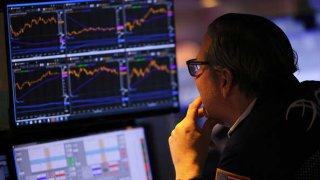
The benchmark 10-year Treasury yield rose Tuesday, reversing an earlier decline, as traders fretted over the prospects of higher interest rates from the Federal Reserve.
The 10-year yield last traded 9 basis point higher at 3.97%, putting it within striking distance of reaching the key 4% level. The 10-year rate last traded at 4% in 2008, according to FactSet.
The 2-year rate, which is more sensitive to policy changes, hovered around the flatline for the day, trading at about 4.3%.
Yields and prices move in opposite directions and one basis point is equivalent to 0.01%.
Get Connecticut local news, weather forecasts and entertainment stories to your inbox. Sign up for NBC Connecticut newsletters.
Markets digested a slew of Federal Reserve speaker commentary after Boston Fed president Susan Collins, Atlanta Fed president Raphael Bostic and Cleveland Fed president Loretta Mester all gave speeches on Monday.
Their comments signaled that the Federal Reserve would continue to prioritize pushing back against persistent inflation, with Mester arguing that "aggressive and pre-emptive action can prevent the worst-case outcomes from actually coming out."
This stance is in line with the central bank's recent policy decisions and its remarks after hiking interest rates by 75 basis points at its September meeting last week.
Money Report
To be sure, Chicago Fed President Charles Evans said he was getting nervous that the central bank was tightening too, far too fast.
"Rising yields in part reflect the unwinding over the last month of expectations for an early pivot in central bank, and particularly Federal Reserve, policy. But we think the rise in longer-term yields may not accurately reflect the risks facing the economy," wrote Mark Haefele of UBS.
"The Fed continues to stress that controlling inflation is its priority ... and the short end of the yield curve is fully priced for a frontloaded hiking cycle," he said. "But longer-term yields may have run too far. The steepness of the recent rise in yields has pushed up real yields, tightening financial conditions and increasing the risk that the US economy tips into recession."
—CNBC's Fred Imbert contributed to this report.






